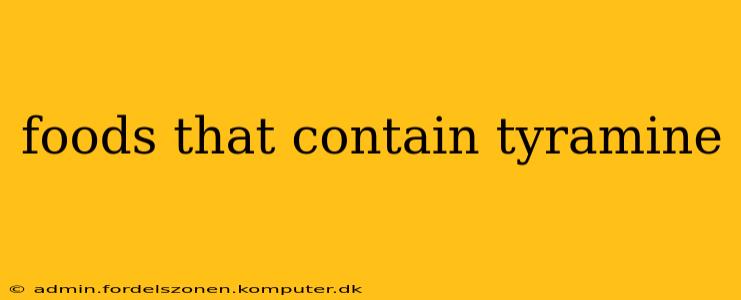Tyramine is an amino acid that's naturally found in many foods. While generally harmless for most people, individuals taking MAO inhibitors (MAOIs), a type of medication used to treat depression and Parkinson's disease, need to carefully monitor their tyramine intake. This is because tyramine can trigger a dangerous rise in blood pressure, a condition known as a hypertensive crisis. This guide will explore foods high in tyramine, those with moderate levels, and how to manage tyramine intake safely.
What Foods Contain High Levels of Tyramine?
Many fermented, aged, or cured foods contain high levels of tyramine. It's crucial for those on MAOIs to avoid these foods entirely. Here's a list of high-tyramine foods:
-
Aged Cheeses: This includes cheddar, Swiss, parmesan, provolone, and many others aged for extended periods. The longer the aging process, the higher the tyramine content. Fresh cheeses, like cottage cheese and ricotta, generally contain lower levels.
-
Fermented and Pickled Foods: Sauerkraut, kimchi, and various pickled vegetables often contain significant amounts of tyramine due to the fermentation process.
-
Cured Meats: This category encompasses salami, pepperoni, bologna, sausages, and similar cured meats. The curing process leads to elevated tyramine levels.
-
Smoked Fish: Smoked salmon, mackerel, and other smoked fish can have high tyramine concentrations.
-
Soy Products: Some soy products, particularly fermented ones like soy sauce and miso, contain notable amounts of tyramine. However, levels can vary greatly depending on the manufacturing process.
-
Leftovers: Food left at room temperature for several hours can allow bacteria to produce tyramine. Always refrigerate leftovers promptly.
What Foods Contain Moderate Levels of Tyramine?
These foods generally contain lower levels of tyramine than those listed above, but individuals on MAOIs should still exercise caution and consume them in moderation.
-
Avocados: While healthy, avocados contain moderate amounts of tyramine.
-
Bananas: Ripe bananas can have higher tyramine content compared to unripe ones.
-
Spinach: A healthy leafy green, but it's worth noting that it contains some tyramine.
-
Chocolate: Dark chocolate, in particular, can contain moderate levels of tyramine.
-
Alcohol: Most alcoholic beverages contain tyramine, with red wine typically having higher levels than white wine or beer.
What About Low-Tyramine Foods?
For individuals on MAOIs, focusing on low-tyramine foods is essential. These generally include fresh fruits (excluding those listed above), fresh vegetables (with the exception of spinach and potentially others), most fresh meats, and poultry. Always check with your doctor or a registered dietitian for personalized dietary guidance.
How to Manage Tyramine Intake
-
Consult your doctor or a registered dietitian: They can create a personalized diet plan tailored to your needs and medication.
-
Read food labels carefully: Even seemingly innocuous products might contain tyramine.
-
Avoid foods with ambiguous descriptions: Vague labels could indicate the presence of tyramine-rich ingredients.
-
Prepare fresh foods: Avoid relying on processed or packaged foods as much as possible.
-
Store leftovers properly: Refrigerate leftovers promptly to prevent tyramine formation.
Frequently Asked Questions (FAQs)
What are the symptoms of a tyramine reaction?
Symptoms of a tyramine reaction can include a sudden and severe increase in blood pressure (hypertensive crisis), headache, stiff neck, nausea, vomiting, rapid heartbeat, and sweating. If you experience these symptoms, seek immediate medical attention.
Can I eat aged cheese if I'm not on MAOIs?
Yes, most people can safely consume aged cheese and other tyramine-containing foods without issue.
Are there any tests to measure tyramine levels in my body?
There isn't a routine test to directly measure tyramine levels in the body. Managing tyramine intake relies on following dietary guidelines provided by healthcare professionals.
Can I still enjoy fermented foods while on MAOIs?
While some fermented foods contain high tyramine, some might contain moderate levels or have variations with lower levels. Always check with your doctor about specific fermented foods and their suitability for your diet.
This information is for educational purposes only and should not be considered medical advice. Always consult with your healthcare provider before making any dietary changes, especially if you are taking MAOIs.
